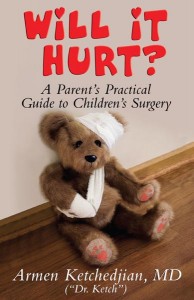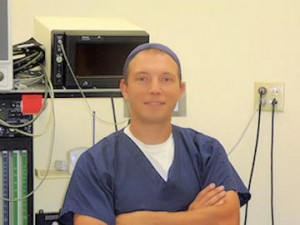During recent tests, doctors placed small plastic acupressure beads, encased in an adhesive pad, on the Extra-1 acupoint between the eyebrows of a test group of children prior to surgery. The effects were dramatic, lowering stress and allowing the patients to avoid the nausea and prolonged effects from anesthesia that the sedatives can cause.
 The patients whose beads were placed on the Extra-1 point showed a significant decrease in stress levels as compared to no noticeable difference in a control group that had the beads placed on a spot above the left eyebrow, not known as an acupressure spot.
The patients whose beads were placed on the Extra-1 point showed a significant decrease in stress levels as compared to no noticeable difference in a control group that had the beads placed on a spot above the left eyebrow, not known as an acupressure spot.
The successful use of the beads to reduce stress is in keeping with the kind of treatment that one anesthesiologist says can help to make recovery times shorter.
Dr. Armen Ketchedjian, author of the book Will it Hurt? A Parent’s Practical Guide to Children’s Surgery, says that pre-surgery anxiety has a negative effect on a child’s body and how it recovers from the stresses of surgery.
“It’s been shown that children that have lower stress levels prior to surgery have better outcomes,â€Â says Dr. Ketch, as his patients call him. “It’s absolutely critical that parents contribute to this process by finding ways put their kids at ease.â€
In his book, Dr. Ketch emphasizes the use of soothing words and honest communication as part of the overall effort to keep children calm. Efforts that can include acupressure beads or regular sedatives.
“One of the most important factors is the parent. If the parents are stressed, the child is going to mirror that,â€Â says Dr. Ketch. “Parents can do their child a great service by learning what they can about the surgery so that their own fears are alleviated.â€
Dr. Ketch hopes that his book will contribute to increased attempts by surgeons and other caretakers to reduce stress in pre-surgical patients. His advice includes:
¤ Accompany your child into the operating room if allowed
¤ Taking advantage of any specially designed waiting room that has a fish tank or toys for your child
¤ Making sure your child is well rested and has followed the surgeon’s pre-surgery instructions to the letter
¤ Bringing games or stuffed animals to the hospital to help your child feel more at home
“Children are better off the more relaxed they are. Anything that can be done to help them relax is a step in the right direction, and I encourage parents to ask their doctors about the day of the surgery and what can be done to provide for their child’s state of mind,â€Â says Dr. Ketch.
Will it Hurt? helps educate parents about pediatric surgery. It is an easy-to-read resource that will give you, your child and your family the help and reassurance you need to make the surgical experience as stress-free as possible.
Listed in The Guide to America’s Top Anesthesiologists by the Consumer Research Council of America, Dr. Ketch trained at Cornell Medical Center, with a fellowship at Memorial Sloan-Kettering Cancer Center and a pain management elective at Boston Children’s Hospital. He has also worked to help develop new techniques in ambulatory anesthesia, taught medical students and residents, and cared for more than 10,000 patients.
Dr. Ketch is also the author of the children’s book Golden Apples (winner of the 2008 Reviewer’s Choice Award), a beautifully illustrated book that aims to help educate children about the dangers of drug abuse.
For more information, contact the author directly at support@dr.ketch.com.
WARREN ENTERPRISES, LLC and author Dr. Armen G. Ketchedjian chose Arbor Books, Inc. (www.ArborBooks.com) to design and promote Will It Hurt? A Parent’s Practical Guide to Children’s Surgery. Arbor Books is an internationally renowned, full-service book design, ghostwriting and marketing firm.
(Will It Hurt? Parent’s Practical Guide to Children’s Surgery by Dr. Ketch; ISBN: 0-9815373-0-8; $14.95; 172 pages; 5½†x 8 ½â€; soft cover book with illustrations; WARREN ENTERPRISES, LLC)
Via EPR Network
More Healthcare press releases


